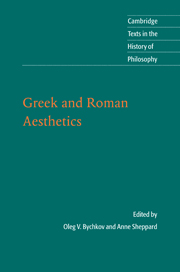Book contents
- Frontmatter
- Contents
- Preface
- Introduction
- Chronology
- Further reading
- Note on the texts and the translations
- Greek and Roman Aesthetics
- Gorgias
- Plato
- Xenophon
- Aristotle
- Philodemus
- Cicero
- Seneca
- Longinus
- Philostratus
- Philostratus the Younger
- Aristides Quintilianus
- Plotinus
- Augustine
- Proclus
- Index
- CAMBRIDGE TEXTS IN THE HISTORY OF PHILOSOPHY
Cicero
Published online by Cambridge University Press: 05 June 2012
- Frontmatter
- Contents
- Preface
- Introduction
- Chronology
- Further reading
- Note on the texts and the translations
- Greek and Roman Aesthetics
- Gorgias
- Plato
- Xenophon
- Aristotle
- Philodemus
- Cicero
- Seneca
- Longinus
- Philostratus
- Philostratus the Younger
- Aristides Quintilianus
- Plotinus
- Augustine
- Proclus
- Index
- CAMBRIDGE TEXTS IN THE HISTORY OF PHILOSOPHY
Summary
On Rhetorical Invention
2.1.1–3
Once upon a time the people of Croton, when they abounded in wealth of all kinds and, according to the common opinion, shared the good fortune of the most successful nations of Italy, wanted to adorn the temple of Juno, which they cared for most piously, with outstanding paintings. For this purpose they employed Zeuxis of Heraclea, hired for a high price. At the time it was considered that he far surpassed all other painters. Now he also painted many other pictures: some of them survived down to our own time because of the sanctity of the shrine. In addition, he announced his wish to paint an image of Helen, in order to capture the supreme example of female beauty in his picture. This was welcome news to the people of Croton, who had often heard that he far exceeded others in painting the female body. They thought that, if he applied great effort in the area where he was most talented, he would leave them a celebrated work of art in that temple. Nor were they disappointed in their expectations. For Zeuxis immediately asked them who their most beautiful girls were. In their turn, they immediately led the man to the palaestra and showed him many very handsome boys. For the inhabitants of Croton at one time greatly excelled in physical strength and handsome appearance, and to great acclaim brought home most glorious victories from athletic competitions.
- Type
- Chapter
- Information
- Greek and Roman Aesthetics , pp. 117 - 140Publisher: Cambridge University PressPrint publication year: 2010

